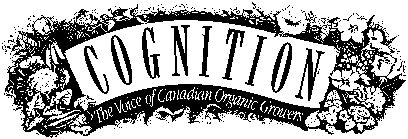

Cognition Index | Virtual Library
| Magazine Rack
Search
| Join the Ecological Solutions Roundtable
HERITAGE SEED PROGRAM
by Garrett Pittenger, President
The Canadian Organic Growers’ Heritage Seed Program has grown from 314 members in 1989 to 1,817 members at the end of 1994. The Growers’ Network, the heart of the Program, was preserving 165 distinct varieties of heirloom and endangered vegetables, fruits, grains and herbs in 1989. By 1994 that number had grown to 1,138 distinct varieties, many of which would now be extinct if it were not for the efforts of HSP members.
A major achievement has been the purchase of Tsolum River Fruit Trees, a nursery of heirloom and endangered varieties of apples, pears, plums, cherries and crabapples. This year, with funding from Environment Canada through its Biodiversity Convention Office, an inventory showed that the nursery is preserving 389 different varieties, 225 of which are not present in the government collections at Smithfield, Ontario and Saanichton, B.C. The HSP will now be operating the nursery as a clonal variety preservation collection, with a view toward ensuring that the varieties being maintained are more widely available.
The nursery has also become home to collections of several crops – garlic, rhubarb and Jerusalem artichokes – for which the Canadian government has no official national collections.
In 1991, Plant Gene Resources Canada (Canada’s national seed bank) and the HSP signed a Memorandum of Understanding (MOU). The seed bank has tens of thousands of seed samples which have to be grown out periodically in order to be rejuvenated but insufficient staff and funding to do this on its own. Under terms of this MOU, HSP members have access to an exciting array of seeds from around the world, and the gene bank receives much needed help in rejuvenating its seed collection.
Also in 1991, a seat was created on the Expert Committee on Plant Gene Resources for a representative from a nongovernmental organization involved with the preservation of plant genetic resources. The committee advises the Canadian government on plant preservation policy. A representative of the HSP has occupied this seat since its creation. This has significantly increased communication and understanding between the government and non-governmental organizations involved with biodiversity, and has led to cooperative projects between the two sectors.
Public education to increase awareness of the importance of preserving biodiversity has always been an important part of the Program’s work. Major articles featuring the HSP have appeared in national magazines such as Reader’s Digest, Canadian Geographic, Harrowsmith, Nature Canada and Canadian Gardening, as well as hundreds of local newspapers and alternative magazines. The Program has been featured on dozens of radio shows, videos and TV programs (including CBC’s Marketplace and the BBC series Millennium).
As well as increasing general awareness about the importance of preserving biodiversity, including the genetic diversity of our cultivated crops, the HSP teaches the public how they can directly participate in this preservation. Our illustrated booklet How to Save Your Own Vegetable Seeds (available in English and French editions) teaches gardeners how they can preserve the seeds of endangered varieties. There is also a Resource List of seed companies and nurseries which sell heirloom and endangered varieties of seeds and plants. By encouraging gardeners to support these small specialty seed companies, the Program helps to create a market for heirloom varieties so that they will continue to be grown, sold, appreciated and perpetuated. Some of the varieties offered by these small companies have found their way back into commerce from original offerings by Program members in the annual HSP seed listing.
The Heritage Seed Program started over fourteen years ago as a project of Canadian Organic Growers and has grown in close association with COG over the years. The Program has now grown to the point where independent non-profit status and formal incorporation are being sought.
If you, as a member of COG, have not joined the Heritage Seed Program, please consider taking out a membership for yourself or as a gift to a gardening friend. You will receive three issues of the HSP magazine each year and enjoy a wide variety of articles covering a full range of interests around heirloom varieties, from science and genetics to history and practical backyard gardening. Most importantly, you will receive the annual seed listing, giving you access to little known but rewarding vegetable, fruit, forage, grain and flower varieties that will expand your gardening and farming horizons. At the core of sustainable organic growing is the living genetic heritage of our crop plants, maintained and handed down from generation to generation. Become part of that tradition and make it your own.
Ed. Note: The Heritage Seed Program is now known as Seeds of Diversity Canada.
Copyright © 1995.
Garrett Pittenger.Reprinted with permission. All rights reserved.
Info Request | Services | Become EAP Member | Site Map
Give us your comments about the EAP site
Ecological Agriculture Projects, McGill University (Macdonald
Campus)
Ste-Anne-de-Bellevue, QC, H9X 3V9 Canada
Telephone:
(514)-398-7771
Fax:
(514)-398-7621
Email: info@eap.mcgill.ca
To report problems or otherwise comment on the structure of this site, send mail to the Webmaster